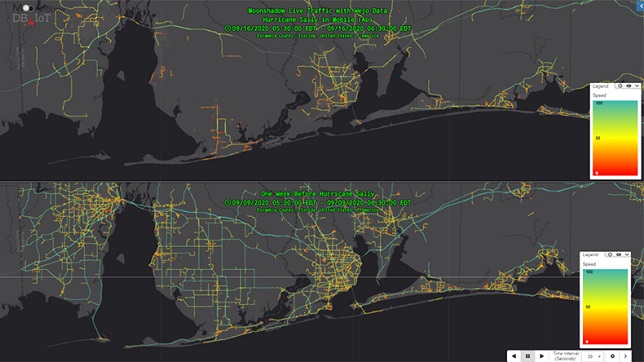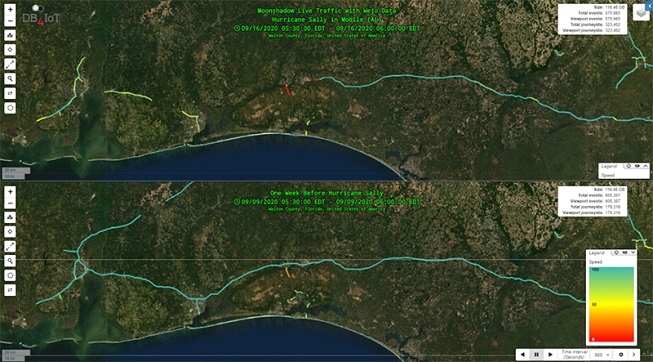Connected vehicle data provides real-time hurricane evacuation
Global data and transportation organizations provide live traffic data to support DOTs in monitoring emergency evacuation transportation

Wejo, Moonshadow Mobile, the University of Maryland CATT Lab, and the Eastern Transportation Coalition have joined forces to provide the Departments of Transportation of Alabama, Florida, Georgia, North Carolina, Tennessee and Virginia with a real-time traffic monitoring system during the hurricane season. The system will use data coming from Wejo, and it’s network of connected vehicles, as people are evacuating to get out of the path of an approaching hurricane.
During an evacuation, one of the biggest problems for traffic managers is how to avoid congestion on major escape routes. With the Moonshadow and Wejo live system, traffic management centers have up to date information on speeds and congestion from hundreds of thousands of driving vehicles within minutes. They can see when traffic is becoming congested and where they need to implement lane direction reversals to increase capacity. The system shows which alternate routes are still moving well and how traffic should be redirected. By playing back movement over time, they also have a good idea when and where the public is evacuating for the approaching hurricane.

“I am very excited to bring this ground-breaking work to our member states. Real time volumes are the most important piece of missing data that agencies need today, especially when monitoring severe weather events such as hurricanes.” says, Denise Markow, Director of the Eastern Transportation Coalition. “Currently, transportation agencies must rely on archived, historical data to make real time operational decisions. Data from vehicles is the future and the Coalition is committed to pushing the innovation barrier to bring agencies critical information especially when it comes to cross border movements.”
Wejo collects data from over 18 million active vehicles in the United States with close to 100 percent road coverage. Moonshadow receives 95% of the data from Wejo within 60 seconds of it leaving the vehicle and ingests it into Moonshadow Live Traffic, an online service based on Moonshadow’s DB4IoT connected vehicle database engine. The University of Maryland CATT Lab has created scaling factors that aggregate the street mapping data every 30 minutes for each day of the week for every road segment. Moonshadow will use the UMD scaling factors to estimate the total amount of traffic on each road segment at any point in time.
Once the Eastern Transportation Coalition became aware of this new technology they rounded up seven of their member state DOTs to participate in a Proof of Concept for this fall. The result is an online system that shows speeds and volume estimates for the entire region within five minutes of real-time.
“In today’s transportation planning world, the problem has been turning the vast amounts of available connected vehicle and mobility data into useful information that helps planners and agencies make informed decisions,” says Eimar Boesjes, CEO of Moonshadow, “Our partnership with Wejo allows us to provide real-time data solutions to those in-need, to change the impact of future emergency situations on cities and the people that live in them.”
Traffic managers from all six states can access the system from a web browser whether they are in the Traffic Management Center (TMC) or on the road. The maps update automatically every few minutes to show the latest data. Moonshadow Live Traffic is fully interactive and users can zoom in on any area to view the traffic situation in detail. Managers can also go back to any point in time in the last 24 hours to view the traffic conditions and even play back vehicle movement. The Wejo data is so exact that speed differences between lanes can be observed as well as where and how traffic is backing up.
Moonshadow Live Traffic using Wejo data is available for any area in the U.S. and can help DOTs, MPOs and cities to better understand evacuation traffic trends from hurricanes, fires, flooding or any other natural disaster.




